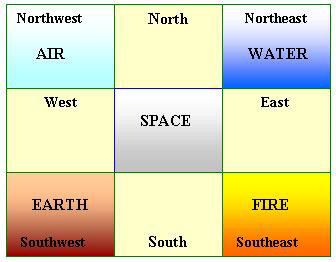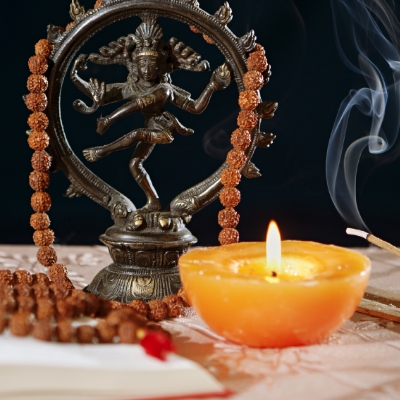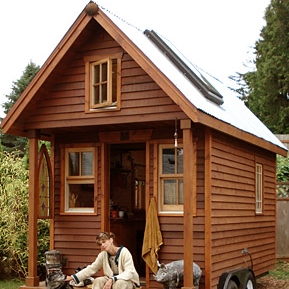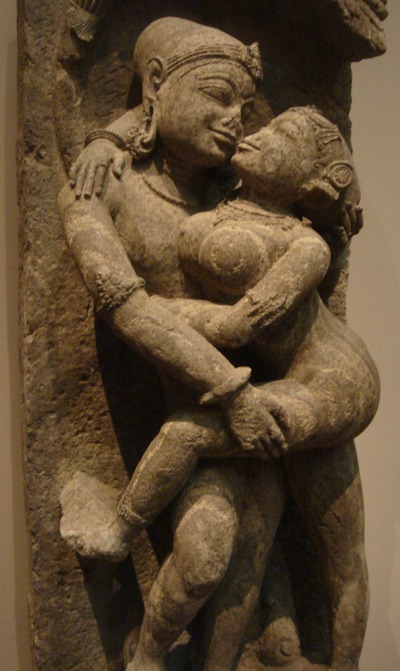Vastu: East Indian Feng Shui
For Beyond 50's "Spirituality" talks, listen to an interview with Karen Andersen.
She'll talk about her work as a Vastu practitioner. Vastu is an East
Indian form of Feng Shui - a powerful way to realign the energy in your
environment (temples, homes, and buildings) so you feel happier and less
stressed. Many of her clients notice the difference in how much
"lighter" they feel immediately after a Vastu session. Similar to
the Chinese practice, Vastu predates it by about 1,500 years and is
based on the balance of the 5 elements: air, fire, earth, water, and
space. She'll explain some practical ways to apply Vastu in your home.
Basic Principles of Vastu

There are many steps that can be taken prior to the construction of a home, based on Vastu knowledge. Feng Shui differs in that respect because it is used after the construction of a home or building.
In both sciences, steps are taken to encourage the flow of Qi (or prana) energies in your environment that can be felt, noticeably.
Some basic understandings in applying Vastu involve shape, direction, Nature's elements, and materials used:
- Energy flows best in a rectangular and square structure. They signify shelter, stability and safety. Where energies get stuck, a Vastu practitioner corrects the stuck flow with yantras and mantras that are a mix of visual symbols (made of royal treasure or metal) selectively placed and sounds made;
- The direction of each room and its associated element matters: NE-Water Element-Represents Spirituality and Flow of Abundance/Prosperity-Living Room, Meditative Room; SE-Fire Element-Kitchen, Electronics; SW-Earth Element-Master Bedroom, Placement of Plants; NW-Air Element-Represents Relationships & Quality of Thoughts and Emotions-Guest Bedroom; Center-Space Element-Affects Success in All Areas of Your Life-Middle of House.
- The Center of the house should be clutter-free and empty;
- East-Northeast is the best direction for a home's main door to allow for the positive energies of light from the sun for the household;
- Place small bodies of water, like a small fountain, aquarium or earthen bowl of water in the Northeast side of the home;
-
The 5 elements of air, water, earth, fire and space are not only
associated with the environment, but the body as well for health and
healing;
- A person's home is considered to be a shrine for spirituality and growth;
- Emphasis on having natural, non-toxic materials in the home, temple and building;
- The right proportion and measurement is also considered.

Feeling the Difference
As a science based on structures, vibrations and energy, Vastu can play a role in your health, happiness and harmony.
Some of the practical, Vastu recommendations can yield immediate benefits that can be felt, such as getting more sound sleep. For best results, it's best to sleep with the South wall behind you. Humans are electro-magnetic beings that can feel the Earth's lines of stress, like too much mind chatter at bedtime, when we sleep in the wrong direction. It also helps to create a relaxing ritual at night that encourages rest because what is experienced before sleeping enters the subconscious mind to affect your dreams.
An excellent placement of windows is
on the Northeast side, based on the cosmic forces of Nature, recognized
in Vastu. Positive magnetic energies come from the North direction and
solar energies from the East. Brain wave studies on children to measure their
academic performance at school confirms that the North direction that is
aligned with the positive magnetic energies supports our left brain
analytical thinking, while the East's solar energies supports the right
brain, creative thinking processes.
When you balance the elements in your environment, opportunity will come. This has been proven by the clients that Sheridan has worked with.
It can take anywhere from moments, months to years to feel the effects of Vastu in your home, she added.
Subscribe to Beyond 50's Radio Updates!
Beyond 50 values your personal information. Your email will
not be used, sold, or
shared with any outside party.
Related Interviews:

Seiki Jutsu

Tiny Home Building

Sex, Love and Dharma
Related Reading:





